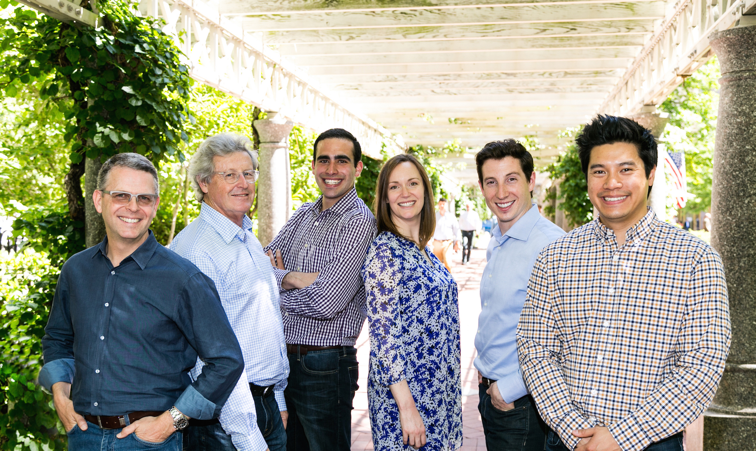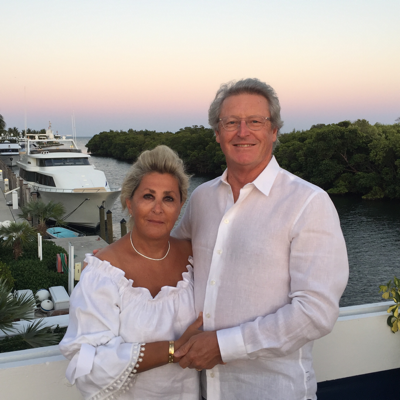John Pearce is Co-Founder and Operating Partner at _Underscore.VC, one of Boston's newest venture capital firms.
Pearce is humble - the type of individual who doesn't look for recognition and instead lets his success speak for itself. He has an amazing track record of success in leadership roles for many of Boston's most successful companies. He was CEO at Demandware and CFO at companies like Actifio, AppIQ, SilverStream, and Watermark. (Actifio is one of Boston's unicorn companies and all the others have successful exited).
The good news for Boston enterpreneurs is that Pearce is now applying his 25 years of experience to help build more anchor companies locally, along with his co-founders Michael Skok, C.A. Webb, and the rest of the _Underscore.VC team. Read more in the interview below.
Keith Cline: Tell me about your background as a child and where did you grow up?
John Pearce: I grew up in Australia. My father was a businessman. His first business failed and the biggest lesson he learned from that was not to have a weak partner. He sold his second business when he retired at 72.
As I was growing up, I was exposed to meaningful conversations around the kitchen table about building the business, like how to survive the next month and pay the bills. The notion of building and running a business became central to my interests.
KC: What brought you to the U.S.?
JP: I came to the United States nearly 30 years ago to launch a business in California for an Australian investor.
My introduction to disruptive business models, which I did not realize at the time, was building a book distribution business based on a series of health and diet books. We sold direct to drug store chains like Walgreens and others, versus selling through traditional publishers as the middle-man.
I was later introduced to David Skok, now a General Partner at Matrix Partners. But back then, he was the CEO at Xionics in the UK, and Michael Skok was on the board. I moved to London and we worked together to turn the company around. Hambro International Venture Partners was an investor in the company and that is how I met Rich D’Amore, who ended up being one of the founders of North Bridge.
I came back to the U.S. and continued working with David on the two companies he founded: Watermark Software (the spin out of Xionics, later acquired by Filenet/IBM), and SilverStream Software (which went public in 1999). Rich and North Bridge were involved in both companies and subsequently at AppIQ and Demandware, where Michael invited me to jump in. Actifio was the next connection.
Over my 25 year career, I’ve had the opportunity to work with so many great people and entrepreneurs. I was also fortunate to work in a variety of roles such as CFO, VP of International Business and CEO. I was able to build upon each experience along the way.
Pearce hanging out at the Saturday Farmers Market on Martha's Vineyard
KC: What convinced you to become CEO of Demandware in 2006?
JP: Michael Skok called me about the opportunity as I was walking on a beach in Florida. You could say the rest is history. But to rewind, at that point in time, the industry was mainly on-premise software from companies like IBM and ATG for the eCommerce sector.
I was impressed with the vision of the company’s founder, Stephan Schambach, and his experience building companies. It was the very early days of SaaS and there was a public SaaS company, Taleo, that I did some research on. I did some back of the napkin math on the opportunity and the data supported my decision and gave me the final conviction to join.
Of course, I did not know what I did not know.
KC: Can you share some of the details that contributed to Demandware’s success?
JP: When I joined in 2006, the company had six beta customers and was in the early stages of trying to figure out its business model. It was the early days of SaaS and the existence of mission critical enterprise SaaS applications.
At Demandware, we were powering a retailer or a brand’s eCommerce site. If their site went down, their revenue went along with it. Thus, they needed 100 percent uptime and - thanks to great people like Wayne Whitcomb and Ulrike Mueller - Demandware’s co-founders and their teams delivered over and over again.
I was lucky to have a fabulous team to support us. Our founder, Schambach, had a tremendous vision. Jeff Barnett, Demandware’s COO, was in the trenches helping figure out the revenue model, and we didn’t have an obvious answer. And as I mentioned, Whitcomb’s team built the backbone to support our customer’s uptime expectations.
Along the way we brought in people like Virginia Alinsug to lead services and Troy Brown, who had the retail and eCommerce DNA to help take our business to the next level. We’re privileged to now have all these people in our Commerce Community and _Cores, helping with some of our first investments like Mautic and Zaius.
Ultimately, at Demandware we figured out that our business model needed to be aligned with the best interests of our customers. We positioned ourselves as a partner with our customer and we would charge a percentage of revenue that went through our platform - we called the model “gross merchandise value” or GMV as it’s become known in the industry. This new idea was a tough sell at first, but over time it caught on.
Since our revenue was based on our customers’ success, it really affected us as a company. We had an amazing team at Demandware and in those day’s we had an internal theme of “no customer left behind.” It became core to the company, its culture and success.
KC: Why did you end up joining Actifio?
JP: I met and worked with Ash Ashutosh (Actifio’s CEO and Founder) at AppIQ, which was acquired by HP. Ash is a great entrepreneur with incredible vision, who is very customer and market centric. He had identified a problem that I could relate to. It was the complex problem of managing storage and he was solving it with great technology. But we knew it wasn’t going to be easy competing against companies like EMC.
I joined as the company’s CFO in 2011. I was excited to be part of the team and it was a great opportunity to disrupt the incumbent solutions out there. I’m proud of what we were able to accomplish, as Actifio is now one of Boston’s anchor tech companies with people like David Chang, Mike Troiano, and Jim Sullivan at the helm. It will undoubtedly continue to thrive.
KC: Why did you decide to get into venture capital as an investor?
JP: I never thought I would get into venture! But that is part of life, finding new experiences that you want to explore. Last year, I got another call from Michael Skok as I was walking on the beach looking to catch up. (I guess I should avoid his calls when I’m on the beach.)
Michael was on his listening tour and looking for some honest feedback on the venture industry and my experience dealing with investors. Since I had been involved in raising money several times from many of the best firms such as Matrix and Andreesen, he wanted my opinions on what worked well and what didn’t work out so well.
A one hour coffee meeting in Boston turned into a three and a half hour discussion with lots of drawings on napkins. I then started looking at some of the disruptive new investment vehicles like AngelList, and changing forms of funding coming from crowdfunding platforms, and incubators, and accelerators. It’s an interesting time in the venture industry and certainly a time for innovation.
Michael and I decided to become partners and met with many other entrepreneurs, which ultimately led to the thesis for _Underscore.VC. We started by working on some joint investments that we later rolled into our initial $75M seed-to-A venture fund. We were very pleased with the reception and have been backed by an outstanding group of Limited Partners, including some of the best children’s hospitals, leading academic institutions, and global foundations.
KC: What are you targeting in terms of terms of investments at _Underscore.VC?
JP: People are the cornerstone to our decisions. How do they think? Can they keep up with and lead the pace of innovation and build a sustainable company? We are focused on being the first institutional capital in, and I’m really excited about the value we can bring with our Community and _Cores who are aligned as partners with us to help at each stage of building great companies.
Beyond people and stage, our core focus is Cloud Intelligence. Back in 2003, Michael developed an investment thesis entitled, “Everything as a Service,” which has proven to be farsighted with decades of investment opportunities ahead.
KC: How is _Underscore.VC differentiating itself from other VC firms?
JP: First off, we bring a community of entrepreneurs and investors aligned to help the founders we invest in. In doing this we’ve created a fund that has aligned itself fully with the interests of the founders.
Within our community, we have built out something which we call _Cores. They are curated groups of peers organized by domain, stage, and skill/function. They have a proven track record at building companies and can give back by advising our entrepreneurs.
Our _Core members can earn shares in our investments for the time they are spending as an advisor, becoming partners with us. They also have the opportunity to invest in our companies with us, again as true partners in the fund, on the same terms and conditions on a deal by deal basis.
Although money is needed to scale a company, it is really the advice and the introductions that our _Core members can provide to our entrepreneurs which makes our model an incredible value add.
In that vein, we’re committed to syndicating with other firms for the good of the Venture Community and of course we’re very committed to Boston. Our goal is to not only build iconic companies that have long term lasting value to the region, but also to bring up the next generation of venture investors from within our firm and from our _Cores.

The _Underscore.VC team
KC: You have announced a couple of recent investments: Mautic and Zaius. Can you share a brief summary on why you invested in each company?
JP: We’re really excited to see our portfolio start to grow and the entrepreneurs behind Mautic and Zaius are outstanding individuals that we are proud to back as they build enduring companies. As we invest, we will continue to post blogs on our website that tell the story of how we got the opportunity to invest in each of our portfolio companies. Those are already online about Mautic and Zaius.
What’s interesting about both of these is that they are in the marketing technology space, an investment area that we see huge opportunity in. As marketing continues to evolve from 1.0 to 2.0, there will be a few great companies building great products to help marketers succeed and allow their customers to increase revenue. We believe that Mautic and Zaius have that opportunity.
Mautic has an an amazing vision, led by founder David Hurley, and its open source approach to marketing automation has already enabled them to experience significant traction with over 50K organizations on the platform, 35-plus integrations, and translations of the platform in 49 languages.
Zaius is looking to solve the difficult single-source of truth problem for business-to-consumer retailers by providing a CRM for them to use that is uniquely built for the scale and velocity of B2C marketers. They already have outstanding customers like Nine West and Moda Operandi and are have a great team based in Boston and Virginia.
KC: What is the meaning behind the name _Underscore.VC?
JP: When we were developing our final name, we thought about how our main job as an investor is to emphasize and highlight the entrepreneurs we work with. We thought that underscore spoke to the fact that our role is to supporting our entrepreneurs and highlighting their strengths.
As we tested the name with our community, we got great feedback for a lot of reasons. My favorite has been around a more subtle part of the name: its relevance to the technology community.
As a Cloud Intelligence-focused firm, the underscore in the name refers to a previously common coding practice. Variables in programming used to use underscores to declare the variable. As a firm, we hope to be the variable that underscores great entrepreneurs. We're making a nod to those who came before us and those to come - connecting them.
KC: What excites you about the current market in Boston?
JP: The Boston tech market is a great place to be. The people are level headed and there are so many great academic institutions with people who are building wonderful things for the future. Our goal is to identify the best opportunities and provide them with the right knowledge and resources to scale and grow.
KC: Are there any companies in Boston outside of your portfolio that you find interesting?
JP: Yes, we have a lot to be proud of in the Boston tech scene. I mentioned Actifio earlier and we have a great list of companies being built. Some that I identify with are Onshape, being led by Jon Hirschtick and John McEleney. Veracode is being led to the next level by Bob Brennan. I am interested to see how Andy Ory’s new 128 Technologies evolves and Simplivity, led by Doron Kempel. And there are many more.
KC: Outside of being a VC, what are you personal interests or activities?
JP: Although my dermatologist does not like it, I like to spend my free time with my wife of 28 years and children golfing, boating, and - you guessed it - being on a beach.
Pearce with his wife, Kathryn, during a function at Ocean Reef in Key Largo, Florida
KC: What TV shows do you watch and what type of music do you like?
JP: I don’t typically watch anything that is not DVR’d anymore. I am a big Blacklist fan.
You might be surprised that I love country music and that I find one of the more interesting bands of recent time is Alabama Shakes.
KC: Are you involved in any charitable organizations?
JP: I’ve lived in Andover for 20 years, and we have had the benefits of that community. I would give a shout out to the great work done by the Boys & Girls Club of Lawrence and the Bellesini Academy in Lawrence.
Keith Cline is the founder of VentureFizz. Follow him on Twitter: @kcline6.



